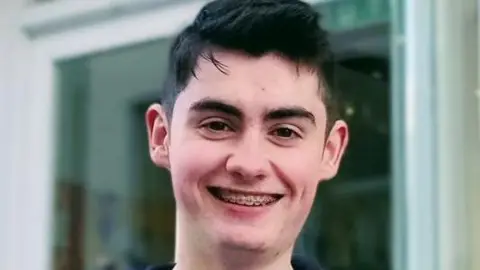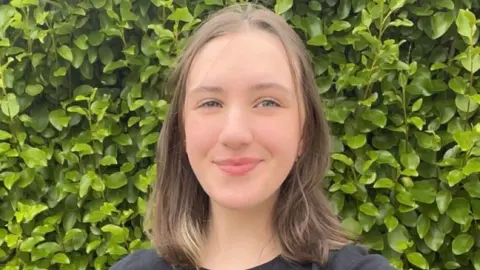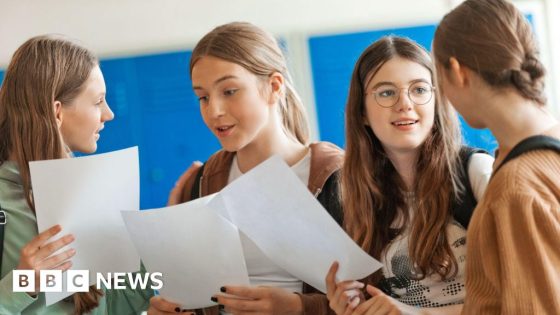 Getty Images
Getty ImagesAbout 32,000 students in Northern Ireland receive their GCSE and some vocational qualification results on Thursday.
As with last week’s A-level results, it is expected that the number of top A* and A grades awarded may fall compared to 2023.
The vast majority of pupils will pick up their results at their school as, unlike A-levels, they cannot receive them online.
The Northern Ireland exam board, the Council for the Curriculum, Examinations and Assessment (CCEA), has signalled that results in 2024 are likely to return to pre-pandemic levels.
GCSE, AS and A-level exams were cancelled in 2020 and 2021 due to Covid-19 pandemic restrictions and pupils were awarded grades calculated by their schools instead.
In subsequent years, pupils have been given assistance including having advance information released about exam topics.
That had led to an increase in the number of top grades awarded, but GCSE results this year are likely to be similar to those in 2019.
 Senan Sheridan
Senan SheridanSixteen-year-old Senan from St Malachy’s College in Belfast is a keen musician and has already achieved an A* in GCSE Music which he took two years early.
“I had to do a performance, a composition and finally a written exam, listening to music and critiquing and evaluating,” he told BBC News NI.
“The music teachers were always brilliant and really supportive and have helped me a lot to get to where I am now.”
Apart from music, he also enjoys languages and maths, and is quietly confident about his results.
“I think they went alright; I tried my hardest and I can only hope for good results. I’m hoping for maybe As and Bs.”
He said the hardest thing about his GCSEs was time management.
“GSCEs really set you up and teach you a lot about time management and commitment; those real-life skills,” he said.
‘I am not going to compare myself’
 Ariana
ArianaAriana, from Parkhall Integrated College in Antrim, says she is “feeling a wee bit nervous” about her results.
“I know I possibly didn’t do the best I could’ve done at the time,” she said.
“I found the exam process difficult and especially having to settle into an exam routine.
“I found that I was quite burnt out by the end.
“My school were able to put in accommodations for me so I have hope, but I am not sure I’ve done the best I could have.”
Ariana wants to study politics, history and English literature at A-level and someday hopes to be a politician or a teacher.
“I am not going to put myself down if I have not done well,” she says.
“There is no point.”
“I am happy for those with top marks but people need to consider whatever circumstances they were in at the time.
“I am not going to compare myself to other people because I know my brain works differently and I excel in things other people do not.”
‘No point being nervous’
 Daisy
DaisyDaisy, from Royal School Armagh, would like to study either law or physiotherapy in the future.
She said: “I have been keeping myself busy throughout summer but sometimes you just randomly remember you have to get these results right before you go to school.
“It’s nerve-racking not knowing for a whole summer and having to wait until the very end.”
Her message for other pupils was: “There is no point being nervous because you can’t change what is in that paper.
“Hopefully all your hard work has paid off and you got enough to do what you want to do, and if you don’t get back into sixth form, there are other options.”
‘Teachers are rooting for you’
 Ciara Murray
Ciara MurrayCiara, from Our Lady and St Patrick’s College Knock, in Belfast, will also get her grades on Thursday.
Among her subjects she studied maths, biology, Irish, history and geography.
“I think I am aiming for As, because it will be much easier to go from GCSE to A-level with As,” she said.
“As long as my hard work is reflected in my grades, I’ll be happy.”
In the future, Ciara hopes to “do something that mixes biology and geography – either something to do with environmental science or earth and ocean sciences”.
But Ciara said that it was hard to choose what to do at such an early age.
She has coped with the wait for results by trying to spend as much time with her friends as possible.
“When we spend time together it is a relief of stress,” she said.
“I’ve tried my best to enjoy the break despite it looming over us, I’d hate to go back in September having wasted my summer worrying.”
“Everyone is very supportive and there is a good sense of community because the teachers are rooting for you.”
The vast majority of GCSEs in Northern Ireland are taken by pupils through CCEA.
The remainder are taken through English and Welsh exam boards, so some pupils in Northern Ireland will receive results in the form of numbers as well as letters.
That is because GCSEs in England are graded numerically from 9 to 1.
Pupils use their GCSE and results of other qualifications like BTECs to progress to A-levels, courses in Further Education, training or employment.
Additional reporting by Sarah Jane McEneny and Lili Busby.
Source Agencies




